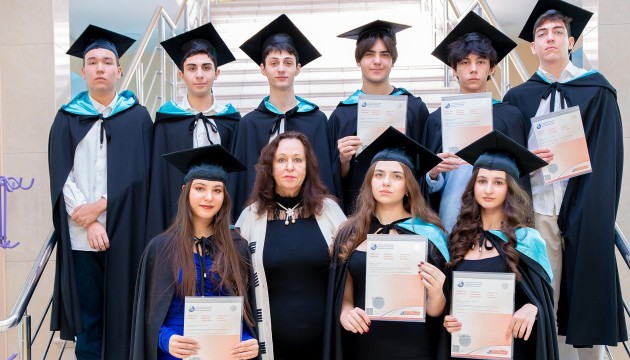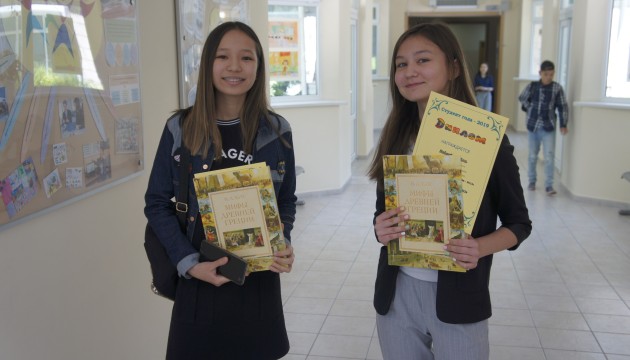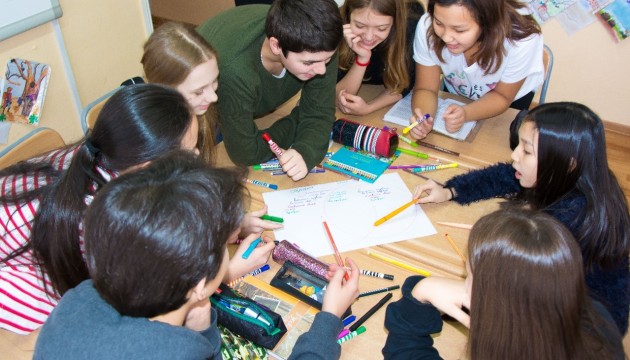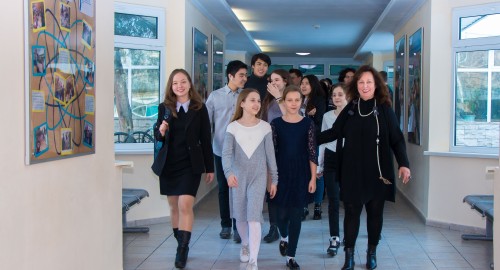The IB programme is structured around eight subject areas, each of which focuses on developing key academic and life skills. Teaching employs a cross-curricular approach, with teachers collaborating across disciplines to help students make connections between different areas of knowledge and apply them to real-life situations.
-
Languages and Literature (Russian Language and Literature)
- Reading, analyzing, and interpreting fiction and popular science literature
- Creating your texts: essays, stories, articles, and critical reviews
- Studying the linguistic and stylistic features of various genres
- Developing skills in oral and written expression of thoughts
-
Language acquisition (English, Kazakh)
- Practice speaking and writing in various situations
- Grammar, vocabulary, and pronunciation
- Reading and analyzing texts in the target language
- Cultural aspects and characteristics of countries where the target language is spoken
-
Human and society (history, geography)
- The influence of historical events on the modern world
- Study of social, cultural, and ecological processes
- Development of analytical and critical thinking in the study of global problems
-
Sciences (natural science, biology, physics, chemistry)
- Fundamental laws of nature and their application in everyday life
- Conducting laboratory experiments and research
- Analysis of scientific data, formulating hypotheses and conclusions
-
Mathematics
- Solving practical problems and mathematical modeling
- Analyzing data and working with graphs and charts
- Developing the ability to apply mathematical concepts in various fields
-
Art (fine arts)
- History and theory of art, analysis of works
- Practical creation of works of art in different techniques
- Development of creative thinking and self-expression through art
-
Physical Education and Health
- Development of physical qualities: strength, endurance, flexibility, coordination
- Theory of sports, physiology, and the impact of physical activity on health
- Participation in sports competitions and team games
- Formation of self-discipline and leadership skills
-
Design (computer science, art)
- Developing and testing your own projects
- Using technologies and software for design
- Solving applied problems using creative and innovative approaches



The working curriculum of Middle School Education at the college (grades 5-9) is developed by the Model Curriculum of the Ministry of Education of the Republic of Kazakhstan. It is primarily aimed at ensuring the high-quality implementation of the State Compulsory Education Standard.
The invariant component of the curriculum for this age group encompasses educational areas, academic subjects, and a weekly and annual academic workload established by the State Educational Standards of the Republic of Kazakhstan.
The variable component is designed to help students in grades 5-9 master the Global Competencies course, focusing on developing moral and intellectual maturity, value orientations, respect, listening skills, and taking responsibility in a rapidly changing world.
The curriculum of additional education for students provides for an inevitable increase in the number of weekly academic hours in the Kazakh language and literature, Russian language, mathematics, algebra, and English, which is studied in depth. These measures have a positive effect on the better assimilation of the curriculum content by students. Following the requirements of the International Baccalaureate, the course "Fine Arts" has been introduced in grades 5-8. Students in grades 7-9 study the special courses "Fundamentals of Economics" and "Solving Physics Problems in English". Students in grade 9 are introduced to the subject "Graphics and Design", which provides the necessary support in studying geometry.
When drawing up the working curriculum of Middle School Education, the implementation of the order of the Minister of Education of the Republic of Kazakhstan on determining the start and end dates of the academic year, holidays, as well as the timing of the final certification of students in grades 9 and 11, was indeed observed.
Considering the additional education component of the working curriculum in Middle School Education, there is a slight increase in the total number of weekly teaching hours by grade. The elimination of student overload is achieved through the approved college operating mode, the organization of self-study, and a well-structured homework schedule. The health-preserving function of the working curriculum is ensured through the implementation of the sanitary rules "Sanitary and Epidemiological Requirements for Educational Facilities", approved by Order of the Minister of Health of the Republic of Kazakhstan No. 76 dated August 5, 2021.

























